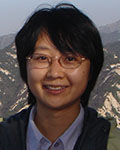2017
Jessica Xiaomin Zu
- Doctoral Candidate
- Princeton University

Abstract
Using Lu Cheng's edition of a new Chinese Buddhist canon against multilingual translations as a probe, this dissertation examines the social turn in theorizing translation and hermeneutics as embodied in the modern Yogacara revival. I seek to demonstrate that rigorous textual analysis was only a means to implement Lu's social reform where critical thinking holds a society together. More than a habit of thinking, for Lu, being critical entails collective practices of organized skepticism guided by Buddhist logic and grounded in compassion. As such, the making of this new canon provides a unique angle to explore ways of denaturalizing familiar concepts such as science, knowledge, society, and critical thinking through the reverse lens of a Buddhist theorization of social issues.

